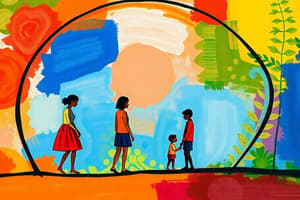Podcast
Questions and Answers
What is family development?
What is family development?
- The growth, change, and adaptation of families over time (correct)
- The study of family structures
- The process of raising children
- The study of family histories
What is the stage of family development characterized by the birth of children?
What is the stage of family development characterized by the birth of children?
- Family Contraction
- Family Expansion (correct)
- Family Formation
- Family Dissolution
What is the family developmental task that involves adjusting to changes in family size, structure, and roles?
What is the family developmental task that involves adjusting to changes in family size, structure, and roles?
- Adaptation (correct)
- Role Flexibility
- Communication
- Conflict Resolution
Which family developmental theory views family development as a series of stages, each with unique challenges and opportunities?
Which family developmental theory views family development as a series of stages, each with unique challenges and opportunities?
What factor can impact family development and well-being, according to the text?
What factor can impact family development and well-being, according to the text?
Flashcards are hidden until you start studying
Study Notes
Family Development Overview
Family development refers to the growth, change, and adaptation of families over time. It involves understanding the various stages of family life, including formation, expansion, contraction, and dissolution.
Stages of Family Development
- Family Formation:
- Courtship and marriage
- Establishment of a new household
- Adjustment to new roles and responsibilities
- Family Expansion:
- Birth of children
- Increased family size and complexity
- Shifts in family roles and responsibilities
- Family Contraction:
- Children leaving the household
- Decreased family size and complexity
- Changes in family dynamics and roles
- Family Dissolution:
- Divorce or separation
- Changes in family structure and relationships
Family Developmental Tasks
- Adaptation: Adjusting to changes in family size, structure, and roles
- Communication: Effective communication among family members
- Role Flexibility: Adapting to changing roles and responsibilities
- Conflict Resolution: Managing conflicts and disagreements
- Intimacy and Affection: Maintaining emotional connections among family members
Family Developmental Theories
- Family Life Cycle Theory: Views family development as a series of stages, each with unique challenges and opportunities
- Family Systems Theory: Focuses on the interactions and relationships within the family system
- Developmental Stage Theory: Emphasizes the importance of understanding family development within specific stages of life (e.g., adolescence, old age)
Factors Influencing Family Development
- Cultural and Socioeconomic Factors: Impact of cultural values, socioeconomic status, and social norms on family development
- Parent-Child Relationships: Influence of parent-child relationships on family development and well-being
- Environmental Factors: Impact of environmental factors, such as poverty, war, or natural disasters, on family development
Family Development Overview
- Family development involves understanding the growth, change, and adaptation of families over time, encompassing various stages of family life.
Stages of Family Development
- Family formation involves courtship, marriage, establishment of a new household, and adjustment to new roles and responsibilities.
- Family expansion occurs with the birth of children, increasing family size and complexity, and shifts in family roles and responsibilities.
- Family contraction involves children leaving the household, decreasing family size and complexity, and changes in family dynamics and roles.
- Family dissolution occurs due to divorce or separation, leading to changes in family structure and relationships.
Family Developmental Tasks
- Adaptation involves adjusting to changes in family size, structure, and roles.
- Effective communication is crucial among family members for healthy development.
- Role flexibility is necessary for adapting to changing roles and responsibilities.
- Conflict resolution skills are important for managing disagreements and conflicts.
- Maintaining emotional connections and intimacy is essential among family members.
Family Developmental Theories
- Family Life Cycle Theory views family development as a series of stages, each with unique challenges and opportunities.
- Family Systems Theory focuses on the interactions and relationships within the family system.
- Developmental Stage Theory emphasizes the importance of understanding family development within specific stages of life, such as adolescence or old age.
Factors Influencing Family Development
- Cultural and socioeconomic factors, such as cultural values and socioeconomic status, impact family development.
- Parent-child relationships influence family development and well-being.
- Environmental factors, such as poverty, war, or natural disasters, can affect family development.
Studying That Suits You
Use AI to generate personalized quizzes and flashcards to suit your learning preferences.




